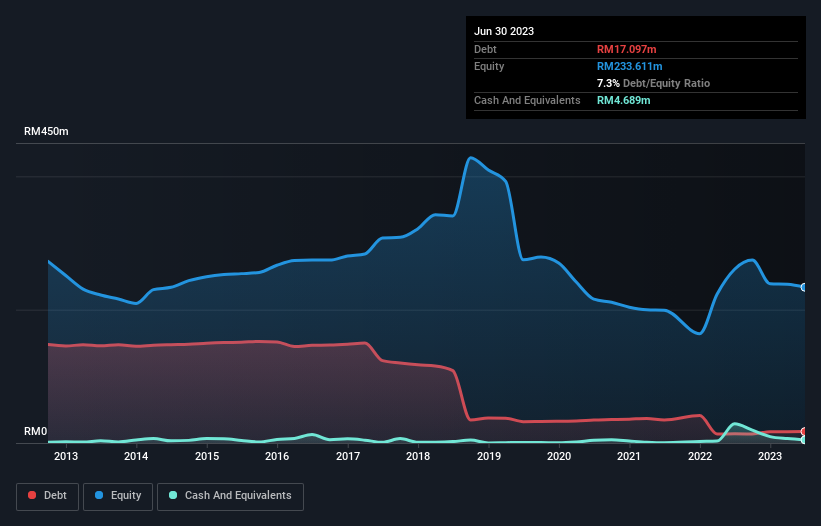- Malaysia
- /
- Paper and Forestry Products
- /
- KLSE:MAXLAND
Is Priceworth International Berhad (KLSE:PWORTH) Using Too Much Debt?

Howard Marks put it nicely when he said that, rather than worrying about share price volatility, 'The possibility of permanent loss is the risk I worry about... and every practical investor I know worries about.' When we think about how risky a company is, we always like to look at its use of debt, since debt overload can lead to ruin. We note that Priceworth International Berhad (KLSE:PWORTH) does have debt on its balance sheet. But is this debt a concern to shareholders?
When Is Debt Dangerous?
Generally speaking, debt only becomes a real problem when a company can't easily pay it off, either by raising capital or with its own cash flow. If things get really bad, the lenders can take control of the business. While that is not too common, we often do see indebted companies permanently diluting shareholders because lenders force them to raise capital at a distressed price. Of course, the upside of debt is that it often represents cheap capital, especially when it replaces dilution in a company with the ability to reinvest at high rates of return. The first step when considering a company's debt levels is to consider its cash and debt together.
Check out our latest analysis for Priceworth International Berhad
What Is Priceworth International Berhad's Debt?
The image below, which you can click on for greater detail, shows that at June 2023 Priceworth International Berhad had debt of RM17.1m, up from RM13.7m in one year. However, it also had RM4.69m in cash, and so its net debt is RM12.4m.

How Strong Is Priceworth International Berhad's Balance Sheet?
Zooming in on the latest balance sheet data, we can see that Priceworth International Berhad had liabilities of RM93.6m due within 12 months and liabilities of RM24.6m due beyond that. On the other hand, it had cash of RM4.69m and RM15.1m worth of receivables due within a year. So it has liabilities totalling RM98.4m more than its cash and near-term receivables, combined.
Priceworth International Berhad has a market capitalization of RM209.3m, so it could very likely raise cash to ameliorate its balance sheet, if the need arose. But we definitely want to keep our eyes open to indications that its debt is bringing too much risk. The balance sheet is clearly the area to focus on when you are analysing debt. But you can't view debt in total isolation; since Priceworth International Berhad will need earnings to service that debt. So when considering debt, it's definitely worth looking at the earnings trend. Click here for an interactive snapshot.
In the last year Priceworth International Berhad had a loss before interest and tax, and actually shrunk its revenue by 49%, to RM61m. To be frank that doesn't bode well.
Caveat Emptor
While Priceworth International Berhad's falling revenue is about as heartwarming as a wet blanket, arguably its earnings before interest and tax (EBIT) loss is even less appealing. Indeed, it lost RM15m at the EBIT level. Considering that alongside the liabilities mentioned above does not give us much confidence that company should be using so much debt. Quite frankly we think the balance sheet is far from match-fit, although it could be improved with time. However, it doesn't help that it burned through RM41m of cash over the last year. So in short it's a really risky stock. When analysing debt levels, the balance sheet is the obvious place to start. But ultimately, every company can contain risks that exist outside of the balance sheet. For example Priceworth International Berhad has 4 warning signs (and 1 which is concerning) we think you should know about.
At the end of the day, it's often better to focus on companies that are free from net debt. You can access our special list of such companies (all with a track record of profit growth). It's free.
New: Manage All Your Stock Portfolios in One Place
We've created the ultimate portfolio companion for stock investors, and it's free.
• Connect an unlimited number of Portfolios and see your total in one currency
• Be alerted to new Warning Signs or Risks via email or mobile
• Track the Fair Value of your stocks
Have feedback on this article? Concerned about the content? Get in touch with us directly. Alternatively, email editorial-team (at) simplywallst.com.
This article by Simply Wall St is general in nature. We provide commentary based on historical data and analyst forecasts only using an unbiased methodology and our articles are not intended to be financial advice. It does not constitute a recommendation to buy or sell any stock, and does not take account of your objectives, or your financial situation. We aim to bring you long-term focused analysis driven by fundamental data. Note that our analysis may not factor in the latest price-sensitive company announcements or qualitative material. Simply Wall St has no position in any stocks mentioned.
About KLSE:MAXLAND
Maxland Berhad
An investment holding company, manufactures and sells wood products in Malaysia, Japan, Taiwan, Korea, India, and internationally.
Mediocre balance sheet low.


